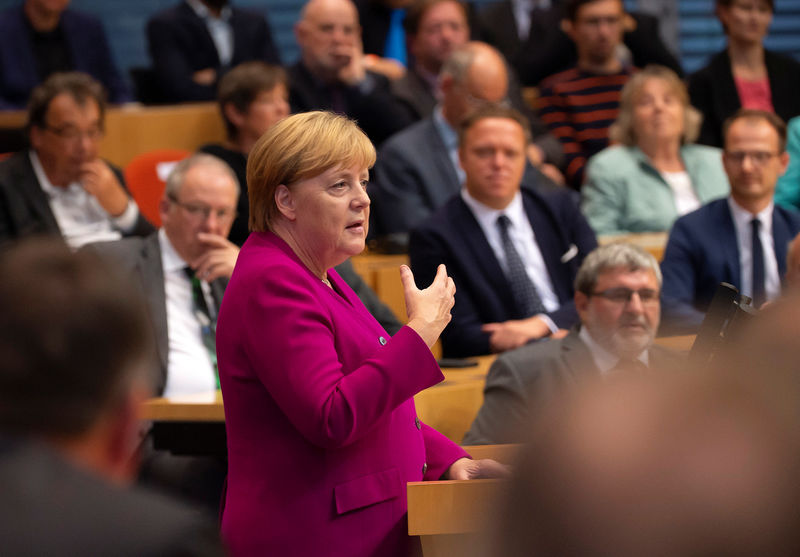BERLIN (Reuters) - Support fell for Chancellor Angela Merkel's conservatives over the past week but rose slightly for their Social Democrat coalition partners after the ruling alliance agreed a package of measures to protect the climate.
The package includes a new domestic carbon pricing scheme, bigger incentives for buying electric cars, higher road tolls for trucks from 2023, and surcharges on domestic flights.
The plan was also aimed at stemming a surge in support for the ecologist Greens opposition, though it risks disrupting industry at a time when the economy may already be in recession.
Support for Merkel's conservative bloc - her Christian Democratic Union (CDU) and their Bavarian allies, the Christian Social Union (CSU) - fell by 2 percentage points to 27%, the survey by pollster Emnid for newspaper Bild am Sonntag showed.
The Greens were unchanged on 21%.
CDU chairwoman Annegret Kramp-Karrenbauer dismissed talk of a rift between her and Merkel after they travelled in separate aeroplanes for meetings in the United States last week.
"There is no quarrel between me and Angela Merkel," Kramp-Karrenbauer told Bild am Sonntag.
The Emnid poll showed a one percentage point rise in support for the SPD to 16%. Emnid surveyed 1,719 voters from Sept. 19 to Sept. 25. The government agreed the climate package on Sept. 20.
The left-leaning SPD needed to clinch a climate deal that its members believed was fair in order to show them that it is worth staying in the ruling coalition.
Germany's oldest party, divided over staying in Merkel's coalition, is holding a protracted leadership race after its worst ever performance in elections to the European Parliament in May forced Andrea Nahles to quit.
Many SPD members say they are fed up of propping up Merkel. The party is to review its role in the government by the end of the year.
Interim SPD leader Malu Dreyer vowed on Saturday to fight hard over the details of the climate package, which still needs to be enacted into law.
"We believe this package is still a good package, that it is a good compromise," Dreyer told reporters. "Now, we will come to the implementation and we will be able to argue with those who perhaps see some things differently."
The Emnid survey showed support for the far-left Linke unchanged at 8%, and the business-friendly Free Democrats (FDP) down one percentage point at 7%. The far-right Alternative for Germany (AfD) gained one percentage point to 15%.
The AfD has sought to attract voters in Germany's poorer east by prioritising coal jobs above the environment.
"Criticism of the so-called climate protection policy is, after the euro and immigration, the third big issue for the AfD," party leader Alexander Gauland told the Welt am Sonntag newspaper.
